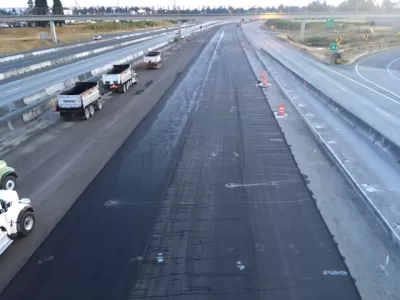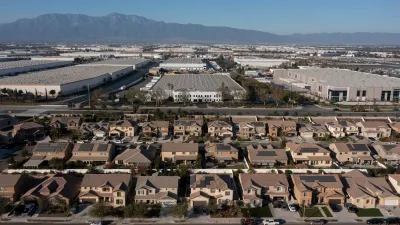Research shows that road asphalt exposed to heat and sunlight may eventually become a significant emissions source.

A new study reports that asphalt emits significant amounts of pollutants in hot conditions. "[Researchers] observed that asphalt emissions doubled when the temperature increased from 40C to 60C — levels the material often reaches in summer," reports Rhi Storer.
When road asphalt was exposed to both solar radiation and heat, to mimic outdoor summer conditions, the researchers found a 300 percent increase in emissions. The release of secondary organic aerosols has been shown to have public health impacts, notes Storer.
While most traffic-related pollution comes from vehicle sources, the impact of cars and trucks may decrease as gross polluters are phased out. As a result, asphalt emissions may contribute more to air pollution as urban areas grow—45 percent of the surface area in the United States is paved—and temperatures rise due to climate change.
FULL STORY: Asphalt roads make city air pollution worse in summer, study finds

Planetizen Federal Action Tracker
A weekly monitor of how Trump’s orders and actions are impacting planners and planning in America.

Map: Where Senate Republicans Want to Sell Your Public Lands
For public land advocates, the Senate Republicans’ proposal to sell millions of acres of public land in the West is “the biggest fight of their careers.”

Restaurant Patios Were a Pandemic Win — Why Were They so Hard to Keep?
Social distancing requirements and changes in travel patterns prompted cities to pilot new uses for street and sidewalk space. Then it got complicated.

California Homeless Arrests, Citations Spike After Ruling
An investigation reveals that anti-homeless actions increased up to 500% after Grants Pass v. Johnson — even in cities claiming no policy change.

Albuquerque Route 66 Motels Become Affordable Housing
A $4 million city fund is incentivizing developers to breathe new life into derelict midcentury motels.

DC Area County Eliminates Bus Fares
Montgomery County joins a growing trend of making transit free.
Urban Design for Planners 1: Software Tools
This six-course series explores essential urban design concepts using open source software and equips planners with the tools they need to participate fully in the urban design process.
Planning for Universal Design
Learn the tools for implementing Universal Design in planning regulations.
Heyer Gruel & Associates PA
JM Goldson LLC
Custer County Colorado
City of Camden Redevelopment Agency
City of Astoria
Transportation Research & Education Center (TREC) at Portland State University
Camden Redevelopment Agency
City of Claremont
Municipality of Princeton (NJ)





























